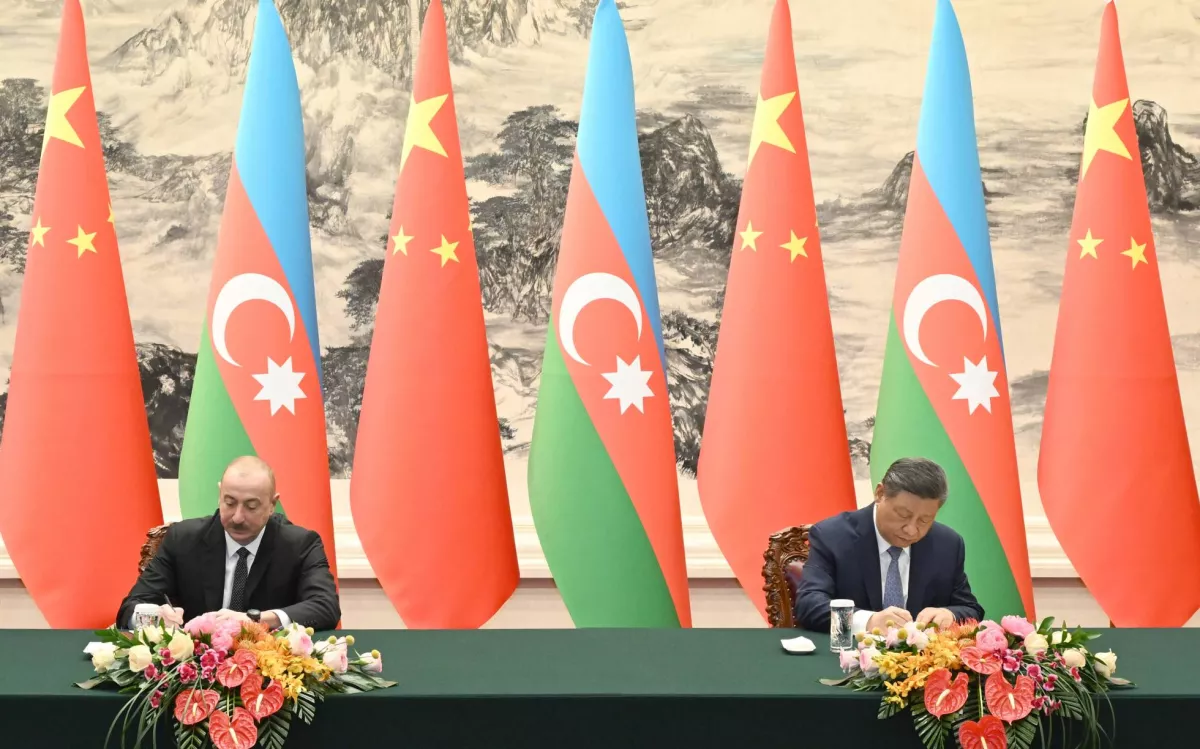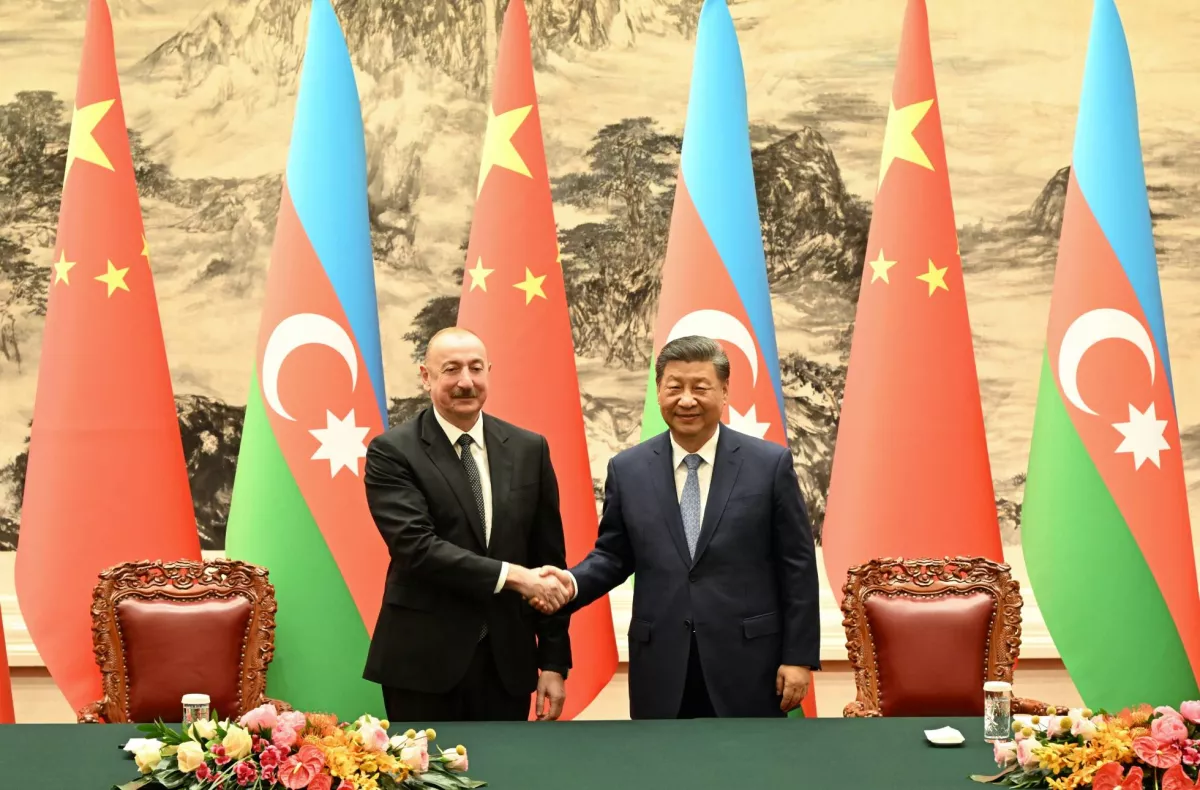Azerbaijan and China strengthen ties Breakthrough strategy
President of Azerbaijan Ilham Aliyev is on a state visit to the People's Republic of China. The status of this visit not only reflects the high level of relations between the two countries but also underscores the growing necessity for strategic agreements.
It is important to highlight that the Azerbaijani leader’s state visit to Beijing also signifies the special attention that China—one of the world’s most powerful nations—pays to its relationship with Baku. This, in turn, is a result of the efforts made by Azerbaijan's leadership, under President Ilham Aliyev, to enhance the country's standing and role on the global stage, to strengthen its sovereignty, and to assert its international agency. These efforts have laid the foundation for ties that are naturally shaped by the geography of the two nations and the dynamics of the global economy.
China is the world’s largest producer and exporter of a wide range of goods, while Azerbaijan is a key country connecting one of the main routes from China and Central Asia to Europe. Both of the countries are committed to peace and stability across the vast expanse of Eurasia—a factor that has become the cornerstone of a solid and forward-looking cooperation agenda.
This agenda has been developing gradually and was first formalised on July 3 of last year during the Shanghai Cooperation Organisation Summit held in Astana, where the Joint Declaration on the Establishment of a Strategic Partnership between the Republic of Azerbaijan and the People's Republic of China was adopted.
However, the evolution of China-Azerbaijan relations on one hand, and global developments on the other, require both countries to assess the experience gained so far and, based on this assessment, to consolidate new, deeper principles of cooperation. The time has come to set yet another—if not the most significant—milestone in Azerbaijan-China relations.

The new agreements signed during the visit—by both President of Azerbaijan Ilham Aliyev and Chinese President Xi Jinping, as well as by members of their respective delegations—span a wide range of areas, from education to energy. The most significant document concluded during President Aliyev’s state visit to China was the Joint Statement on the Establishment of a Comprehensive Strategic Partnership between the Republic of Azerbaijan and the People’s Republic of China. This document sets the course for deepening cooperation across all key sectors, with its political dimension standing out particularly against the backdrop of current global trends.
At the heart of this new phase in relations is a high level of political trust. The Azerbaijan-China partnership is founded on mutual support for sovereignty, security, and territorial integrity. Azerbaijan has reaffirmed its firm commitment to the One-China policy, fully supporting Beijing’s position on the Taiwan issue. In turn, China has expressed its support for Azerbaijan’s peace agenda, demonstrating solidarity in the regional politics of the South Caucasus.
It can be stated with a fair degree of confidence that Beijing’s firm support on this matter will likely deter certain Western countries from pushing their own agenda for the peace process between Azerbaijan and Armenia—an agenda aimed at reviving the so-called "Karabakh case."
The Statement also notes that Azerbaijan supports China’s chairmanship of the Shanghai Cooperation Organisation (SCO) and values the practical efforts made by the Chinese side to promote the qualitative development of the organisation. In return, China supports the elevation of Azerbaijan’s legal status within the SCO. This is a significant point, highlighting the importance Beijing attaches to Azerbaijan within an organisation that represents one of the institutional pillars of the Global South. From the same perspective, it is also worth noting that China supports Azerbaijan’s chairmanship of the Conference on Interaction and Confidence Building Measures in Asia (CICA).
The Statement also emphasises the strengthening of dialogue between the ruling parties—New Azerbaijan Party and the Communist Party of China—as well as between the legislative bodies of both countries. This development not only broadens bilateral channels of communication but also enhances coordination in international and regional organisations such as the SCO and CICA.

Azerbaijan and China have declared their commitment to a multilateral world order based on the principles of the UN Charter. Both countries condemned hegemony, unilateral actions, and protectionism, expressing their support for a fairer system of global governance and for reform of the international financial architecture.
Azerbaijan also expressed its readiness to take part in China’s international initiatives on global development, security, and civilisation. This signals an ideological convergence against the backdrop of increasing polarisation in global politics, where the role of alternative centres of power is growing.
While this article focuses primarily on political matters, it is also essential to note that both sides expressed their readiness “to initiate negotiations on a free trade agreement aiming to establish robust institutional guarantees for deepening cooperation in the fields of trade and investment.”
And finally, a piece of excellent news that directly concerns the citizens of both countries: the document reflects a mutual willingness to further facilitate people-to-people exchanges and to agree upon and sign an intergovernmental agreement on the mutual abolition of visas for holders of ordinary passports. According to the statement itself, this will “serve as an impetus for enhancing contacts and cooperation across all fields.”
The signing of the joint statement on strategic partnership, along with several other agreements—as well as the state visit of President Ilham Aliyev to China, conducted in a warm and trust-based atmosphere—has, on the one hand, become a marker of global shifts, and on the other, a powerful stimulus for the economic integration of vast Eurasian regions, particularly the South Caucasus.








